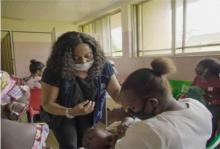World Breastfeeding Week 2020- Caregivers emphasize breastfeeding benefits for mother and child
Abuja, 8 August 2020 - "Exclusive Breastfeeding in the first six months is a good way of keeping your baby healthy and preventing them from contracting childhood diseases such as diarrhoea", says Paulina Fidelis Sharia, a43 year old nurse at the Bwari General Hospital, Abuja.
Mrs Sharia, emphasizing the benefits of breastfeeding for newborns and mothers to over 100 breastfeeding mothers present, took advantage of the sensitization meeting organized by the Federal Capital Territory (FCT) and the World Health Organization (WHO) on 07 August 2020 to commemorate the end of a week of activities dedicated to breastfeeding education, to further highlight other benefits for mother and child.
Most children who are exclusively breastfed are protected from getting infected with common childhood illnesses, Nurse Sharia, said, for one example, and parents can save more by spending less money on medicines. And when a mother breastfeeds, it promotes bonding between her and her baby, reduces risk of developing some illnesses such as breast cancer as well as give rooms for birth spacing,” Nurse Sharia added.
Celebrated in over 120 countries by WHO and partners, the World Breastfeeding Week holds every year from 01 to 07 August. The aim is to encourage breastfeeding and consequently improve the health of babies around the world.
The week provides an opportunity to raise awareness on the importance of exclusive breastfeeding in the first six months of a child's life. It’s also a good time to enlighten nursing mothers on the benefits of breastfeeding for their own health.
Attesting to the importance of breastfeeding, Rose Dan, a mother of five said she has never regretted breastfeeding her children exclusively for the early parts of their lives and beyond the recommended six months.
"I didn't regret it because my children do not fall sick anyhow especially within their first six months,” Mrs Dan said. “Even when I was breastfeeding my twins, it was not easy, but my husband encouraged me. Most mornings, I woke up hungry, so what I did was to always cook excess food.”
While analysis indicates that increasing rates of exclusive breastfeeding could save the lives of 820 000 children every year, WHO estimates that currently, only around 44 per cent of infants globally are exclusively breastfed for the recommended first six months. Meanwhile, Nigeria has a low performance on exclusive breastfeeding as the 2018 National Nutrition Health Survey shows that only 27 per cent of infants in the country are exclusively breastfed for the recommended first six months.
In her remarks, Dr Joy Ufere-Isikima of WHO Nigeria said that in line with the World Breastfeeding Week 2020 theme - ‘Support breastfeeding for a healthier planet’- noted that there is the need for improved skilled breastfeeding counselling for mothers so they can have a better understanding of the benefits of breastmilk. That knowledge, she added, can help mothers to build confidence and overcome challenges that could force them to adopt feeding practices known to interfere with optimal breastfeeding. Examples are liquids, foods, and other breastmilk substitutes often given to infants below the WHO-recommended six months after birth.
One huge advantage, Dr Ufere-Isikima said, is that breastfeeding provides a level field for all and respects every woman’s circumstances and choices. However, she urged, mothers need the right environment and adequate support from families and communities for effective breastfeeding. “Breastfeeding provides every child with the best possible start in life. It delivers health, nutritional and emotional benefits to both children and mothers and it forms part of a sustainable food system.”
According to her, families and communities can support the breastfeeding mothers both to get started and to sustain breastfeeding by creating a comfortable home environment where she can practice and get used to breastfeeding and all that it physically and emotionally requires, take up additional household chores like cooking, cleaning, and laundry from her when necessary and give supportive words or encouragement when she is facing breastfeeding difficulties.
One breastfeeding-supportive husband who followed his wife to the clinic, Mr Austin, urged men to always support their women the way he does. Mr Austin said he supported his wife who exclusively breastfed their babies for the first six months and then complemented breastfeeding with other baby foods till the children were 24-months-old.
At the end of the event, Mrs Sharia, the nurse in Bwari General Hospital, said WHO’s efforts in promoting skill breastfeeding counselling have been impactful. According to her, aside championing the World Breastfeeding Week every year, WHO has also been a supportive partner in ensuring the children are fully immunized as well. She further expressed gratitude towards WHO’s efforts in “promoting and setting norms and health care standards for health workers that have contributed in the health and well-being of our mothers, children and nations as a whole.”
Technical Contact:
Dr Joy Ufere; Email: uferej [at] who.int (uferej[at]who[dot]int); Tel: +234 803 979 5143



